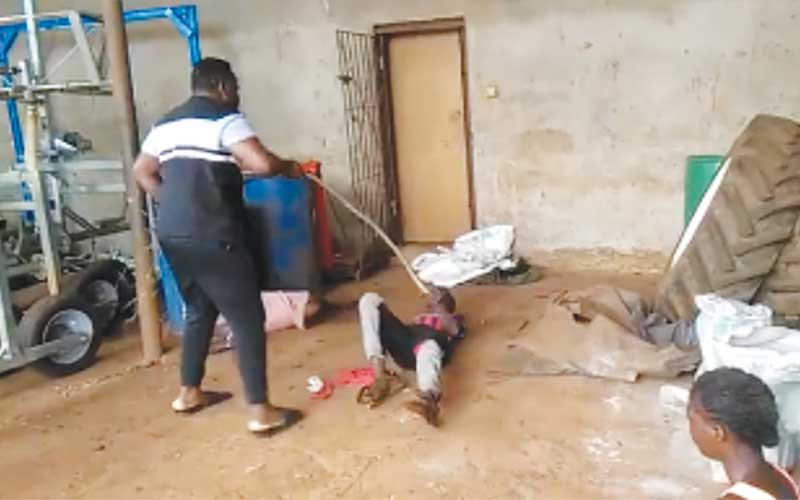
ZIMBABWEANS are increasingly taking the law into their own hands, subjecting criminals, including love cheats, to instant justice in what observers said was a sign of lack of trust in the justice system.
Some criminals have succumbed to the beatings while others have been left with broken limbs.
The perpetrators have been caught on camera or even recorded themselves assaulting, torturing, harassing or sometimes detaining the offenders to force them to admit to their crimes.
Rights lawyers said citizens were taking the law into their own hands because they no longer had faith in the police and justice system following various cases of impunity by the politically-connected elites.
Social media is awash with videos of people applying instant justice on suspected criminals, and rights activists condemned the incidents as gross abuse of human rights.
Recently, Paddy Zhanda Jnr (40), the son of the former Lands and Agriculture deputy minister Paddy Zhanda, was caught on video assaulting his three employees who were handcuffed for allegedly stealing potatoes at his farm.
Early this year, in Matobo, Matabeleland South Province, nine men were arrested after beating to death a suspected habitual thief who had terrorised villagers and was on the police wanted list.
A few days after the incident, three men in Bulawayo’s Makokoba high-density suburb also assaulted to death another man who had broken into one of the assailants’ houses.
- Can Zimbabwe hold a credible election?
- Letter from America: Ariel Primary: A school that teaches pupils to be angels
- Can Zimbabwe hold a credible election?
- Letter from America: Ariel Primary: A school that teaches pupils to be angels
Keep Reading
In another video, which was reportedly filmed in Tsholotsho, unidentified men assaulted three men with logs while they were tied onto a tree on allegations that they stole cattle.
A man whose hands are tied to his legs is also seen in another video while he is being assaulted under the feet, with onlookers pouring water on him.
The other video shows suspected burglars being assaulted and forced to sing, while swearing that they would not steal again.
Human rights lawyer Musa Kika said the rise in instant justice cases showed lack of trust in the justice system by members of the public.
“Self-help and citizen justice is a sign of something gone wrong,” Kika said.
“It traditionally occurs where there is breakdown of public trust in the institutions and mechanics of the formal justice system. People then resort to taking the law into their hands.
“This is what happens when rule of law and the efficacy of justice sector institutions is compromised. It is as simple as that.”
Kika said the country’s justice delivery system needed to regain the trust of the public to stop the vice.
“Those who mete out instant justice through self-help are themselves emboldened by the impunity, that is confidence that they themselves are likely to escape justice,” he said.
“This is also a symptom that there is so much criminality around, and the people are tired of it, and it is a cry for help to arrest criminality in our society.
“Either way, it is a call to action.”
Southern Africa Political Economy Series director, Ibbo Mandaza concurred with Kika saying the rampant incidences of political violence in the country had influenced ordinary citizens to normalise brutalising other people.
“That is why they have taken the law into their own hands,” Mandaza said.
“Violence has been normalised in the country, with perpetrators enjoying impunity, therefore, they no longer fear to commit violence-related crimes.
“The rate at which violence is occurring in the country needs to be exorcised.
“The state must realise how bad things are and act to restore trust between justice and the people.”
Crisis in Zimbabwe Coalition chairperson Peter Mutasa said the state has allowed lawlessness to prevail through impunity.
“This has created a culture of vigilantism and it is this culture that is breeding this social problem,” Mutasa said.
“It is known that the Zimbabwe Republic Police are capable of stopping the crimes, but politicians have captured the system.
“If not controlled, this problem arising from impunity will spread until there is anarchy and chaos in the country. The solution is strict application of the law without fear or favour.”
National deputy police spokesperson Chief Superintendent Blessmore Chishaka said police are aware of the various incidents of instant justice.
“We continue to appeal to members of the public to stop taking the law into their own hands,” Chishaka said. “Whenever they apprehend suspected offenders, they should hand them to the police.
“Instant justice is a crime and whoever is caught in such criminalities will be arrested.”










